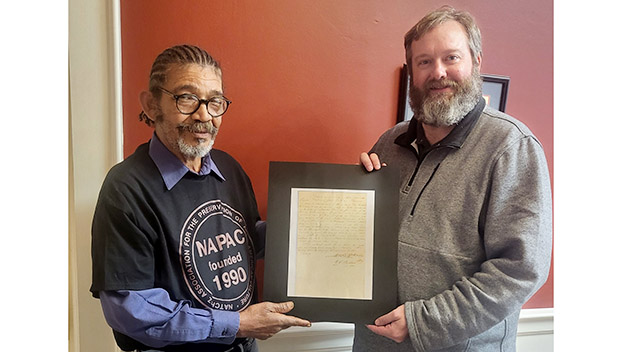Mississippi city receives rare 1828 document from anonymous donor. Artifact shows sale of enslaved man for $500 to early settler.
Published 9:36 am Wednesday, February 8, 2023
A Mississippi museum has acquired a rare 1828 document showing the sale of an enslaved man to early settlers in Mississippi.
Officials from the Natchez Museum of African American History and Culture about the rare document. which was purchased in January by an anonymous donor and then delivered to City Hall in Natchez.
The document is a bill of sale by slave traders Warren Offutt and Rice Ballard for the sale of a 21-year-old man named, Aaron, whom they sold for $500 to John Henderson of Natchez.
It was purchased in January by an anonymous donor, who delivered it to the office of Richard Burke, Mayor Dan Gibson’s executive assistant.
The person who gave it to Burke asked him to insure it was donated to the museum. Bobby Dennis, executive director of the museum, said he was both surprised and very pleased with the donation.
The document reads as follows:
“Know all men by these presents that we Warren Offutt & Rice Ballard for and in consideration of the sum of five hundred Dollars to us in hand paid by John Henderson of the City of Natches the receipt whereof is hereby acknowledged have bargained sold and delivered and by these presents do bargain sell and deliver to the said John Henderson One Negro Man named Aaron about twenty one years of age and we do hereby warrant the said Negro Man as a slave for life to the said John Henderson his heirs and assigns against the legal claim of all and every person or persons whomsoever and do also warran[t] the said Negro Man to be at this time bound in mind and body.
“In witness whereof we have hereunto set our hands and seals at Natches this twenty seventh day of December 1828. Witness: Warren Offutt, R. C. Ballard”
David Slay, chief of interpretation for the Natchez National Historical Park, said the document is significant for several reasons.
“It documents the existence of a 21-year-old Aaron and the other enslaved people from the McInnis estate, which will be of value to genealogists in that Aaron and the others likely have descendants in this region,” Slay said. He noted this could be a key piece to someone’s ancestry search one day.
“It is a tangible artifact of the domestic slave trade in this region,” Slay said. “It is a physical object representing the selling of a man’s life in Natchez in 1828, who was bound both ‘mind and body’ to John Henderson.”
According to the information provided with the document, on the day of the sale, “Henderson advertised an auction of ten slaves in two families from the estate of Norman McInnis of Concordia, Louisiana, to be sold at auction on January 2, 1829.” However, three years later, he penned a letter to a Washington, D.C. newspaper in which he proposed “a method for the gradual abolition of slavery.”
More News






